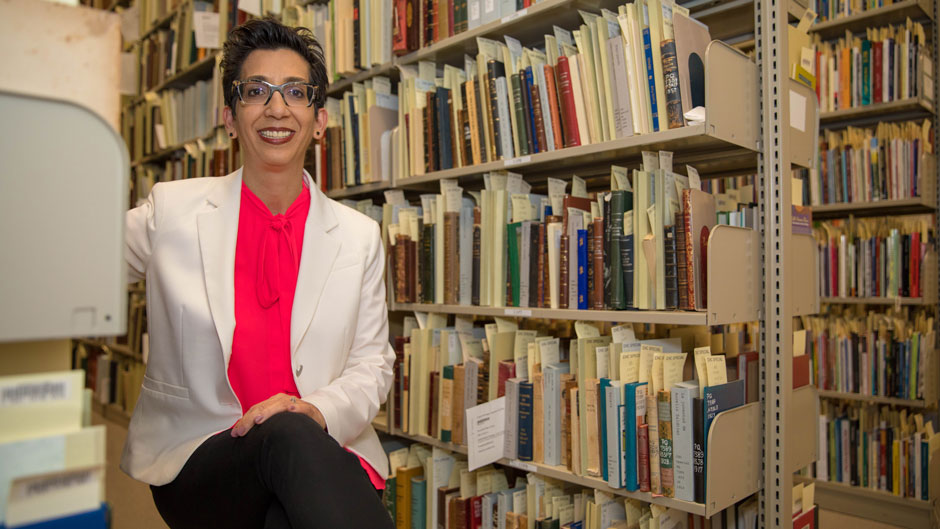Elizabeth Cerejido has spent countless hours scouring the treasure trove that can be found in the University of Miami Libraries Cuban Heritage Collection (CHC), researching the different archives, artwork, pictures and other documents for her work as an art historian and scholar of Cuban and Cuban-American art.
In all that time, she always hoped that she would return to CHC as its director. On August 6, Cerejido, an independent curator, academic and art historian, will begin her role as the newly appointed Esperanza Bravo de Varona chair of the CHC, one of the largest depositories of Cuban books, documents and artifacts outside of the island. The endowed chair honors the founding director of the collection, Professor Emerita Esperanza Bravo de Varona, who worked at UM for 45 years until her retirement in 2013.
“It is exciting to be here,” Cerejido said. “When I walked in here (the first time) I felt a connection with the place. It is the crown jewel of the library but also of the Cuban exile community. There are so many opportunities to expand and make accessible the rich repository of materials on Cuban Studies that make up this unique place.”
Cerejido is respected in Miami’s art circles for her artistic and cultural projects on Cuba, some of which sought to bridge the work of artists from both sides of the Cuban diaspora.
UM Provost Jeffrey Duerk expressed the University’s pride in not only the CHC, “but also the engagement of the community in building it as an important international asset. The recruitment of this world-class scholar and curator to UM could also not have happened without the strong engagement and support of the Amigos Board and the local community.”
Born in Cuba, Cerejido came to the United States as a baby with her mother in 1970, and grew up in Miami. In the past two decades, she has devoted both her academic and professional life to the study of the island and the Cuban diaspora through its visual arts. She also has studied extensively the history and art of Latin America.
As a curator of Florida International University’s Phillip and Patricia Frost Art Museum from 2002-2007, she honed her curatorial and programming skills, as well as fundraising skills, creating exhibition projects that expanded and highlighted the museum’s Latin American holdings.
“Elizabeth Cerejido is well prepared for this role,” said UM Dean of Libraries Charles Eckman. “I would note her impressive record as researcher, curator, collection and gallery consultant and fundraiser—as well as her personal connection to the Cuban Heritage Collection as a Goizueta Fellow.”
In 2014, Cerejido received a research grant from the CHC, which allowed her to study the collection’s holdings on the visual arts in Cuba and the exile community. She assessed the areas where the collection needed to boost its materials and held a public talk on the subject of building an artist archive at CHC. Subsequently, she was awarded the prestigious Goizueta Research Fellowship, which funded her initial research on the construction of Cuban-American art in the United States – the topic of her doctoral dissertation.
Drawing from her curatorial experience as she enters her new role, Cerejido plans to make the CHC more accessible to the UM community and the community at large through a series of curated programs. Broadening the CHC’s reach also means creating cross-disciplinary connections such as Cuban Studies and Latino Studies, African-American Studies, LGBTQ, Women’s and Gender Studies and representing Latin American Studies more broadly.
“It is important how you make the CHC collection accessible,” Cerejido said. One example Cerejido is already planning on is to exhibit the collection’s highlights and invite a series of scholars, artists, performers, and others from different disciplines to engage with these materials in ways that help activate the collection holdings and make them relevant to different audiences.
Members of the Amigos Board of the CHC, who are the fundraising arm of the Collection, can be extremely helpful in spreading the word about the collection, she said. Aida Levitan, chair of the Amigos Board, looks forward to working closely with Cerejido.
“Cerejido is a very respected art historian and artist who is well acquainted with the Cuban Heritage Collection, as well as with the Cuban-American, Latin American and local art world,” said Levitan. “Her reputation and professional trajectory will help us tremendously as we seek new donors and wider accessibility to the collection.”
Jose P. Bared, a senior member of the University’s Board of Trustees, said, “Cerejido’s scholarly eye, coupled with her extensive knowledge in drawing diverse audiences, will serve us well. We are lucky to have found someone who so intimately knows how special the Cuban Heritage Collection is.”
Cerejido has developed many contacts in the local and national arts community. In 2015, she was the mastermind of Dialogues in Cuban Art, a multi-year exchange initiative that brought engaging encounters between Cuban and Cuban-American artists as well as other cultural actors from Miami and Havana. For that project, she was able to secure funding from several organizations, including the John and James L. Knight Foundation.
Dean Eckman stressed that Cerejido’s experience in the art world will only help to highlight the many riches the University holds.
“There are significant points of convergence between the work of galleries, libraries, archives and museums (GLAMs) in the digital era,” he said. “The Libraries at UM—including the Cuban Heritage Collection—are working closely with the Lowe Art Museum on a number of fronts. Ms. Cerejido's appointment both reflects and will certainly enrich this conversation, both at UM and beyond.”
Cerejido received a Bachelor of Arts in Art History from Florida International University in 2002 and a Master of Arts in Latin American Studies at the University of Miami in 2009. She is in the final stages of earning a Ph.D. from the University of Florida in Art History. The working title of her thesis is Locating (other) Cuban American Art Histories in the United States: Artistic Production, Cultural Politics and Identity Formation.

